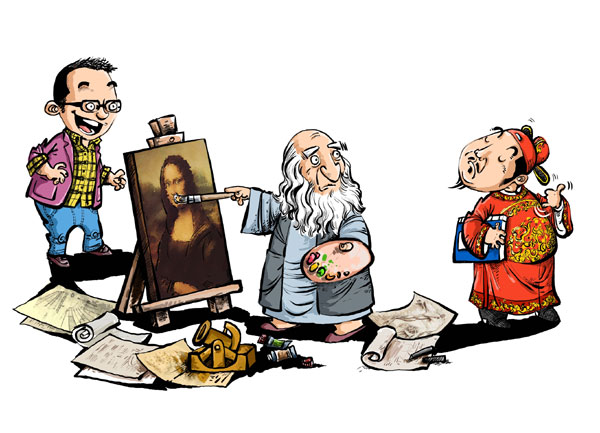Thumbs up for hands-on knowledge
By Raymond Zhou (China Daily) Updated: 2014-04-12 07:20
 |
| Pang Li / China Daily |

The cultivation of a vast, technically proficient workforce requires a change in mindset and - more difficultly - in traditional culture. Redefining priorities at the get-go stage, such as the national college entrance exam, is a wise decision.
An official of the Ministry of Education recently disclosed that China's all-important college entrance examination is to be seperated into two, giving place to the training of highly skilled workers.
To grasp the full impact of this measure, it is necessary to alert ourselves to the split nature of our job market for college graduates. On the one hand, millions of new graduates face tough competition each year, leaving many without a job offer and struggling on the outskirts of urban centers; on the other hand, many vacancies cannot be filled as employers fail to find suitable candidates.
|
|
 |
 |
What it needs is an abundant and sustained supply of highly skilled workers, such as operators of sophisticated machinery, those who will fill the needs of the economy well into the new phase of development.
On average, China spews out 17 million young people each year from its schools into the employment pool. About 7 million of them are from institutions of higher learning. But only 1.4 million receive the kind of technical training that "will help them find pretty good jobs", said Lu Xin, the deputy minister, who used a public forum to reveal details of the coming change in the entrance exam.
There are three kinds of "skilled talent", Lu says. The first is engineers, the second highly skilled workers and the third high-quality laborers. Of course, China's colleges do produce engineers, but engineers are not expected to perform tasks traditionally done by workers, at least "workers" in the sense of physical laborers.
China needs an ever-replenished reserve of professional practitioners who possess a certain level of expertise to perform in the information age. They may not be required to innovate as senior engineers do, but they are by no means workers of your grandfather's generation who simply went through preordained routines, because those jobs have increasingly been replaced by automation and computers. It is this middle stratum, the so-called high-skilled workers, that is highly deficient in the current phase of growth.
When you hear of a home caretaker or a certain factory position offering a salary higher than that typically associated with a college professor, you know how high the demand is.












